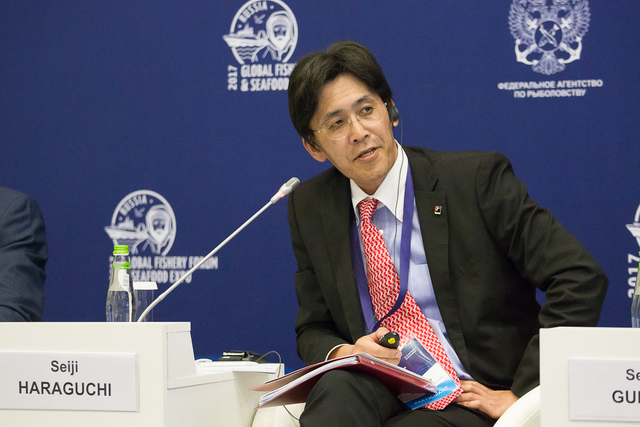Northern Irish fishing community anxious over Brexit deal
Mon 26 Nov 2018

The fishermen of Kilkeel campaigned for Brexit two years ago under a jovial banner of a cartoon fish which sported a helmet, armour, a union jack shield and the legend “Fishing for Leave”.
The image symbolised hope that this fishing community in Northern Irelandand others across the UK would escape European Union strictures and enter a new, blue yonder of British maritime sovereignty.
After the referendum passed, the flags stayed on the boats, fluttering in triumph.
Now there is no sign of them. Instead, flapping in chill autumnal winds, is a new flag showing a map of the UK and the legend “No Fishing Sellout”. A new, anxious message.
“It doesn’t appear that we’re going to get what I voted for,” said Charlie McBride, 65, a veteran fisherman who owns two boats. “We were told we’d get our 200-mile limit back, we were promised that.”
Fishermen were promised a lot of things: an extended exclusive fishing zone; bigger offshore quotas for UK vessels and curbs on foreign fleets which currently hoover up most of the shellfish, plaice, Dover sole, herring and hake in UK waters; a harpoon driven through the common fisheries policy (CFP) foisted on them when Britain joined the European Community in 1973.
But as the House of Commons prepares to vote on a Brexit deal many of those who work the docks in Kilkeel, home of Northern Ireland’s biggest fishing fleet, wonder if they detect an acrid zephyr wafting in from the across the Irish Sea, one more pungent than the usual mix of crab, prawn and diesel: the smell of betrayal.
Brexit and backstops: an explainer
“The government has been bending over backwards to Brussels,” said Raymond Patterson, 40, a mechanic working on the Steadfast, a 19-metre prawn trawler. “It seems they’re already conceding.”
The latest reason for foreboding is dispute over whether fishing will be part of a wider trade package, which could see fishing rights sacrificed for other priorities.
A draft political declaration says the UK and EU will establish a new fisheries agreement, ideally by 1 July 2020, enshrining the UK as an “independent coastal state”. Government sources insist a fisheries deal will be negotiated separately to trade policy, though this does not rule out EU member states getting access to UK waters.
However some MPs from fishing constituencies in England and Scotland are sounding the alarm, saying this sounds like the hated common fisheries policy in all but name.
“It’s really hard to predict what’s going to happen,” said Christopher Huggins, a University of Suffolk politics lecturer who writes about fishing policy.
“The political declaration effectively leaves the future relationship with the EU on fisheries to be determined. Fishing is a small part of the overall UK economy but it is vital to the local economy of many coastal communities and has political salience so for the government it’s a balancing issue.”
Heather Millar, who runs a fish stall and equipment store in Kilkeel, is bracing for the worst. “We don’t know if London will trade our fishing rights to the EU for something else. I think they will. Historically that’s what they’ve always done.”
The fear is that all the Brexiter talk about fishing being a totemic industry and part of British identity will run aground on hard numbers.
Fishing comprises less than 0.5% of the UK’s GDP – an economic minnow. Northern Ireland’s fishing industry is even tinier. Its 310 registered vessels account for just 6% of the UK’s fishing fleet. Their catch of 17,000 tonnes per year is worth about £30m – 4% of the value of fish landed into UK ports.
“There may be a temptation to sell us out to get some bigger and better deal,” said Alan McCulla, who runs the Anglo North Irish Fish Producers’ Organisation from an office on Kilkeel dock. “This is politics, it’s a negotiation.”

















